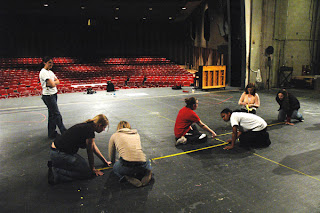Working through the CPD23 programme, I've felt myself building a confidence in my skills and my ability to learn new tools or absorb new information to extend my abilities, and to recognise the appropriateness of doing this - at which points it proves useful for my work and when it's not an efficient use of my time. I have to confess, looking at the CILIP PKSB I can feel that confidence sapping away slightly, as I realise I'm clearly not a real librarian, as I'm lacking in so many skills. To name but a few:
- Cat & Class (yes, I know, but I've never had to do these things! I'm good at buying stuff though...)
- Informetrics
- Information Architecture
- Database Design
- Data Analytics
- Information Assurance and Audit
- Archiving and Web Continuity
- Influencing Key Stakeholders
- Business Planning and Asset Management
- Strategic Marketing
- Systems Design
- Language Skills
 |
| Photo by Brett Holman on Airminded.org |
Perhaps the gaps in my knowledge are far more gaping than I realised?! But what kind of Personal Development Plan could ever rectify this desperate state of affairs??? *deep breath*
Obviously I'm letting insanity take over a little bit here, because I'm employed in one role in the library, so I have a specific subset of skills that suit my role, and I can't do everything! Of the aspects I think are relevant to my role I think I have developed a good level of competency, and there are also clearly areas where I would like to develop my skills as well - such as support for researchers, bibliometrics & library research. One of the best aspects of completing the CDP23 programme has been the elements of reflection on my own practice - yes playing with lots of online tools and (finally!) setting up my own blog has been fun, but considering how to use these tools in an effective manner, and what I would want to achieve by utilising them is just as important.
Perhaps another aspect of this programme is the degree to which online tools are also deeply rooted in media and marketing. While many aspects of web 2.0 tools are social, and to a degree personal (e.g. blogs, Twitter) they are still broadcasting messages about the library - its tone, its relevance, its priorities - and while reaching students in a variety of ways is great, you also need to reach them using appropriate language and regarding issues they are actually interested in! I suspect marketing and outreach are two areas I'd be particularly keen to include in my Personal Development Plan going forwards, not least to build on everything I've learned through CPD23 about web tools and about myself.
So, my plan now is to think about ways of plugging the gaps, keep on blogging - sharing and reflecting on my experiences in the library (and possibly not in the library!) - and see where it takes me. Once more unto the breach, dear friends....



